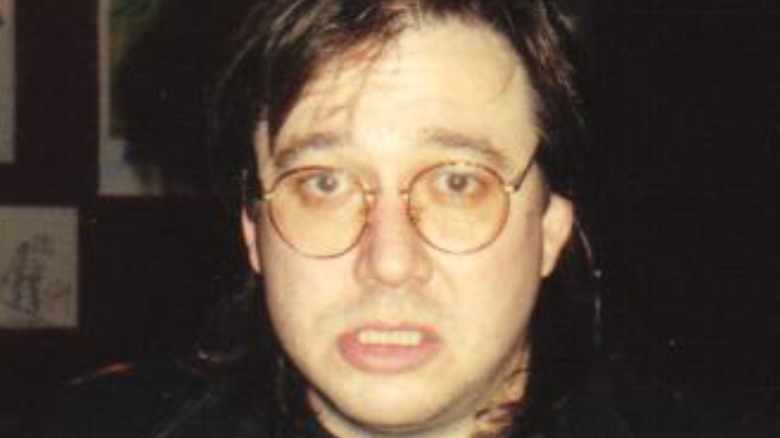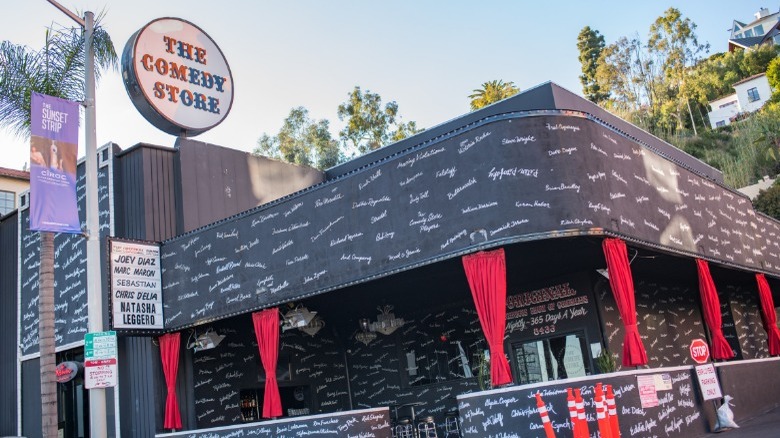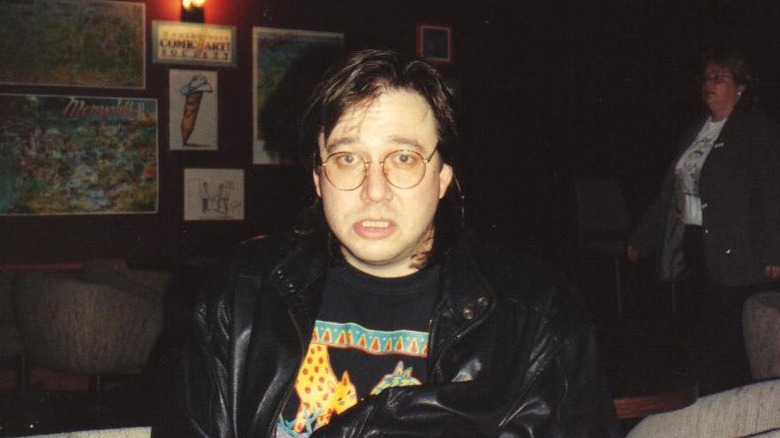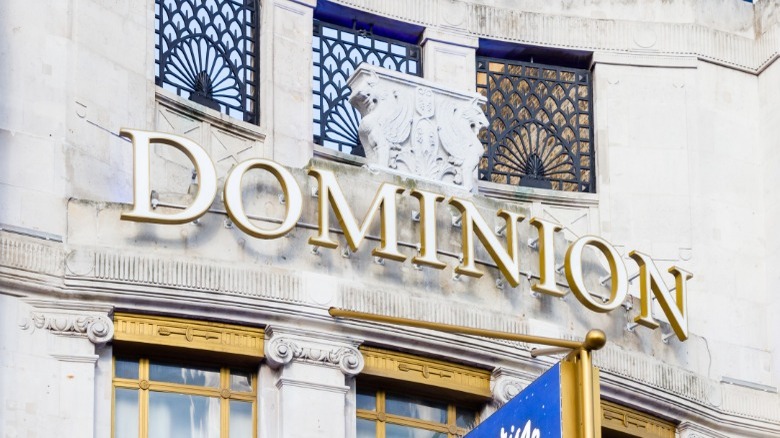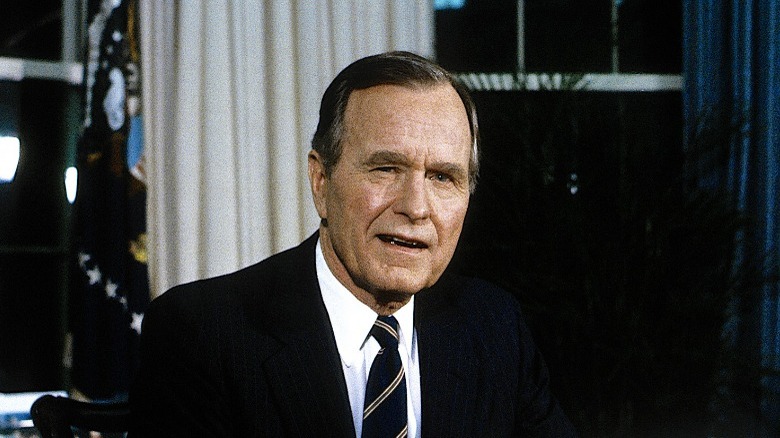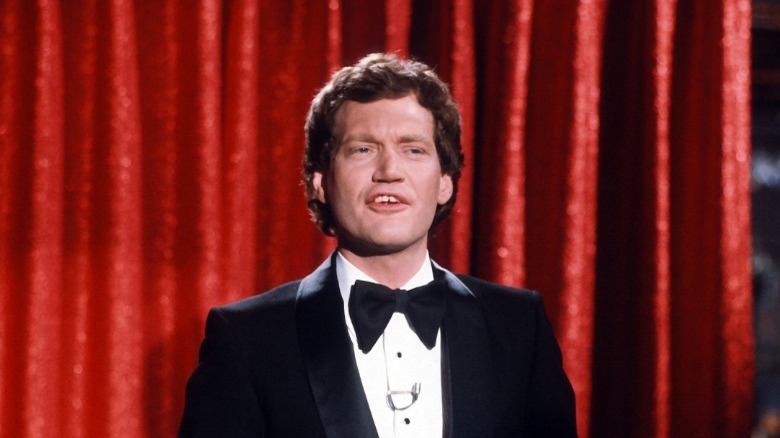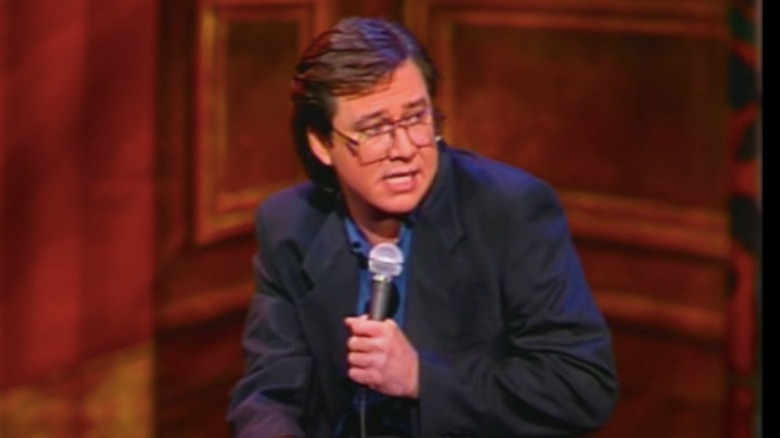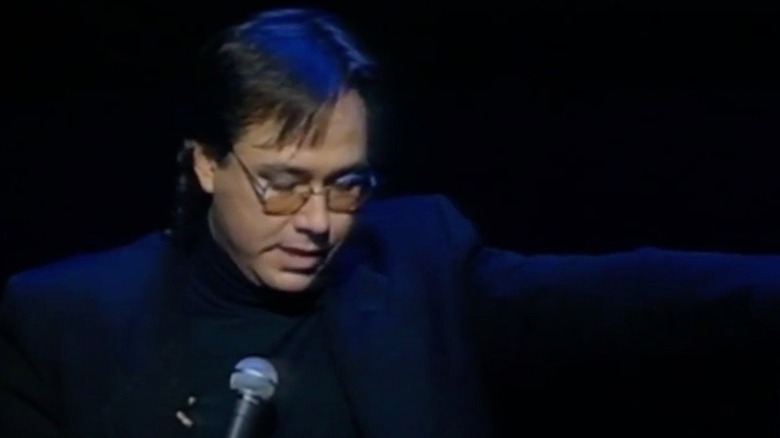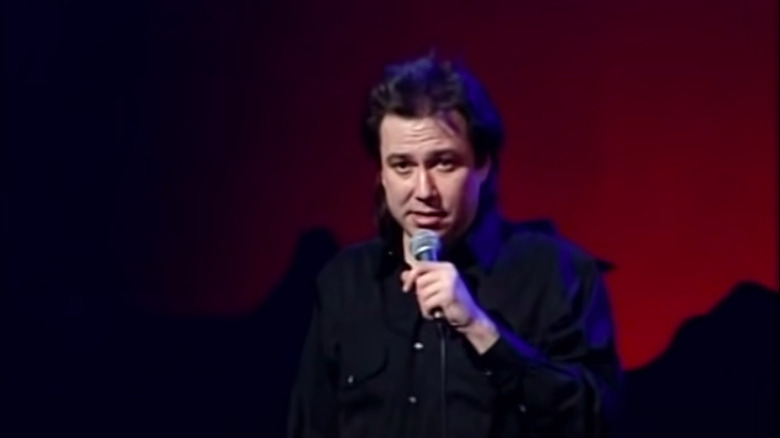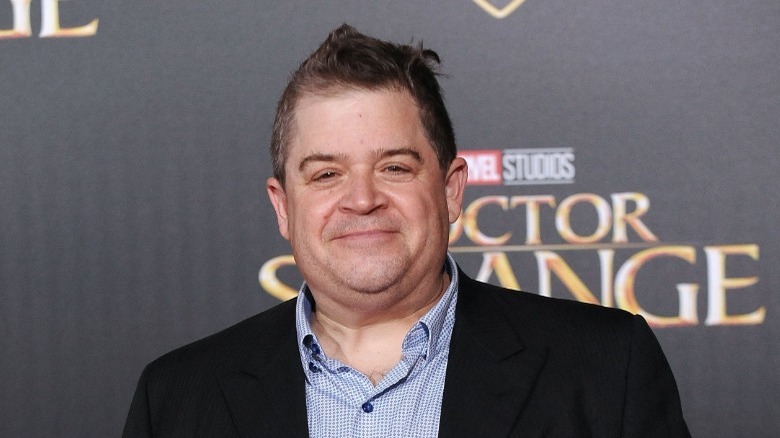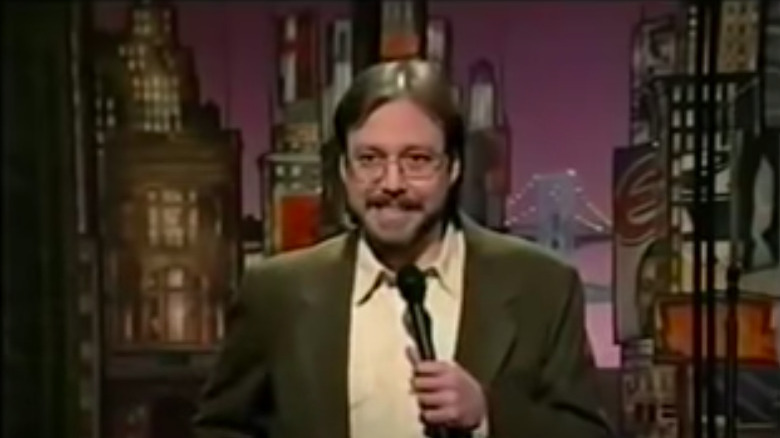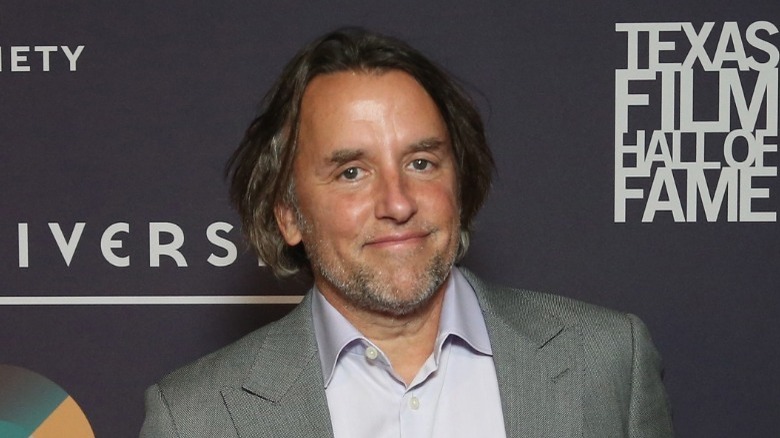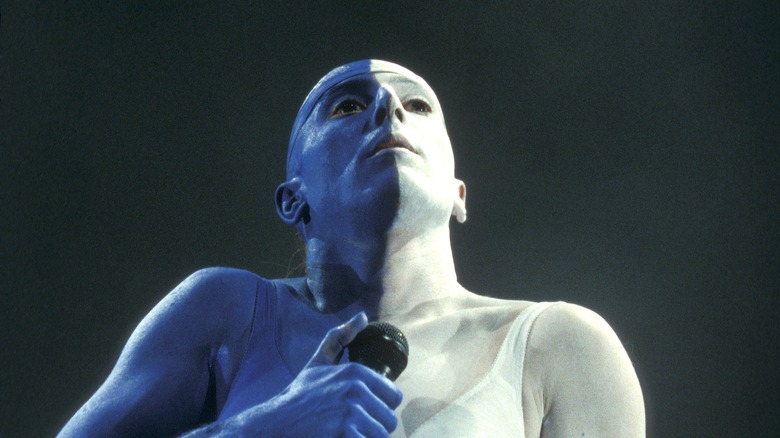The Untold Truth Of Bill Hicks
Bill Hicks was born William Melvin Hicks on December 16, 1961. His father moved the family from Valdosta, Georgia to Florida, Alabama, New Jersey, and finally Houston, Texas where Hicks grew up in the Memorial neighborhood (via Britannica).
Hicks' parents had discouraged his early flair for comedy, such as when they stopped him and his friend Dwight Slade from performing on Jerry Lewis' Muscular Dystrophy Association telethon. However, Hicks continued with standup through high school. When he got a new opportunity at the Comedy Workshop in Houston, Hicks sneaked out his bedroom window and down a drainpipe, running to a nearby church where he hitched a ride with Slade and their mutual friend Kevin (via New Yorker).
From the early 1980s until his premature death in 1994, Hicks established himself as a cult comic with followings in the U.S. and especially the U.K., where he found his most enthusiastic audiences. He was revered for not only his caustic wit, which often attacked corporate and political culture, but also his existential musings. Here is the untold truth of Bill Hicks.
He moved to Los Angeles to pursue comedy
In 1976, Bill Hicks met his friend Dwight Slade during sixth grade Spanish class (via Dwight Slade). They shared a love of comedy and worked together for 18 years, including several formative years in Los Angeles, where they lived after high school.
Speaking with The Guardian, Slade remembered this part of life very fondly, "Our whole world revolved around that relationship ... There were no bills, no college, no women, just your friend and you cracking each other up. It was a marvelous part of my life." He added, "When Bill got on stage ... it was as if nothing had ever been on that stage before. People were absolutely sucked into him, and the rest of the show was forgotten." According to The Herald, Slade's brand of comedy was more slapstick than Hicks', who was in what writer Tim Abrahams described as the "lone poet mold."
In 1983, Hicks and Slade, who performed together as "Bill and Dwight" (via The New Yorker), took different paths. Slade went to the Pacific Northwest, while Hicks returned to Houston.
He was a heavy user of drugs and alcohol
Inspired by hard-living comics such as Lenny Bruce, Richard Pryor, and Sam Kinison, Bill Hicks believed he had to follow suit if he was to reach their comic prowess, saying, "I would drink my own body weight in whiskey and snort my own body weight in cocaine" (via Irish Times). In his 1991 "One Night Stand" show, Hicks defied the usual sobriety story, "I have taken drugs before and ... [pause] I had a real good time!" He added, "I didn't murder anybody, didn't rob anybody, didn't rape anybody, didn't beat anybody, didn't lose one f***ing job ... [I] laughed my ass off and went about my day."
However, despite the fun and surreal experiences he had, Hicks' life had been in downward spiral because of drugs and alcohol, and his brother Steve Hicks remembered what happened when he went sober: "In 1988, Bill quit doing drugs and quit drinking and cleaned up his life. He got booked back on Letterman a couple of times ... he'd been on there in '84 and '85 but wasn't on until about '88 because he was so sporadic and inconsistent." Perhaps his lowest point occurred when a bartender threw him up against a jukebox and broke his leg. Hicks went cold turkey after that incident (via EW).
Yet, although Hicks experienced the destruction of substance abuse, he was still frustrated by the media's overly negative news items on drugs. Joe Rogan remembered one of Hicks' defining "positive drug story" gags, "[Voice of newscaster] A man on acid realizes that all matter is energy condense to a slow rhythmic vibration ... here's Tom with the weather!"
Bill Hicks found greater acclaim in the U.K.
Bill Hicks sold out shows in the U.K., especially at the Dominion Theatre in London, where he gave sold out shows to the 2,000-seat auditorium (via New Yorker). It was at the Dominion Theatre that Hicks lamented the state of American comedy to writer John Lahr: "Comedy in the States has been totally gutted ... it's commercialized. They don't have people on TV who have points of view, because that defies the status quo."
Hicks made his U.K. debut during the "Stand Up America!" show in November 1990. Later, in 1991, Hicks won the Critics' Award at the Edinburgh Fringe Festival, which was followed by his "Dangerous" tour in 1992, which took him across Britain and cemented Hicks' affection for the nation. When asked about American, British, and Canadian audiences by The McGill Tribune, Hicks said, "I like the British the best. I have more success over there. They have a sense of irony and sarcasm that Americans lack ... they share my sense of anti-Americanism."
Years later, Channel 4 ranked Hicks as the sixth greatest comedian of all time, ahead of performers such as Chris Rock, Woody Allen, and Ricky Gervais (via Comedy).
Bill Hicks was a critic of George H. W. Bush
In clarifying his political stance during his "Salvation" show, Bill Hicks said that George H. W. Bush was "The child of Satan here to destroy the planet earth ... [I'm] a little to the left." However, he also took a skeptical view of Democrat Bill Clinton, "They're all the same. I mean in America there's one party, the Business Party. All they're out for is to maximize profit ... what's Clinton gonna do? If he brings in a bunch of P.C. scumbags, little fascists, it'll just get worse" (via McGill Tribune).
Hicks was often conspiratorial in his political thinking, "Whenever a new American president is elected they are brought into a small dark room in which the 12 biggest industrial/corporate/military/economic heads are sitting. One of them pulls down a film screen and shows the new president a video of the JFK assassination from an angle never seen before. They then turn to the president and say 'Any questions?'" (via Irish Times).
Hicks may have been using the comedians' tool of exaggeration, but it is safe to say that he had boundless distrust of the political establishment.
David Letterman 'banned' his performance
In October 1993, just a few months before his death, Bill Hicks was censored on "The Late Show With David Letterman." This is because the "CBS office of standards and practices" balked at the content of his six-minute set because it "touched on too many hot spots," according to producer Robert Morton (via New Yorker). It would have been his first appearance on U.S. national television. Hicks protested the move, saying he had passed the material by his 63-year-old mother without any offence caused, yet the decision had been made. This actually did wonders for Hicks' publicity, getting the comic "more attention than my other eleven appearances on Letterman times one hundred."
Despite this issue, Hicks never harbored resentment to the show's host, "I get David Letterman a lot. I love Letterman, but every time I go on, we have tiffs over material. They love me, but his people have this fictitious mainstream audience they think they play to. It's untrue. It doesn't exist."
Years later, in 2009, a contrite Letterman invited Bill's mother Mary to a special show dedicated to her son. After apologizing to Mary, Letterman aired the censored material and added, "Seeing it now, it raises the question, what was the matter with me, what was I thinking? ... It says more about me as a guy than it says about Bill" (via Salon).
Bill Hicks was a critic of corporate culture
Bill Hicks' hatred of corporate culture was a running theme of his comedy. In 1991's "Relentless," Hicks had very choice words for those he perceived to be part of the corporate culture, such as any performer who did advertising: "You can print this in stone and don't you ever forget it, any performer that ever sells a product on television is for now and all eternity removed from the artistic world."
On the subject of advertising and marketing, Hicks truly went for the jugular, "By the way, if anyone here is in advertising or marketing — kill yourself. Seriously, though, if you are, do. There's not rationalization for what you do and you are Satan's little helpers. You are a ruiner of all things good."
On this subject, Hicks followed the tradition set by other comics such as Lenny Bruce and George Carlin, who had expressed similar misanthropic contempt for all things false and money-minded (via Britannica).
Bill Hicks lamented anti-intellectualism
At the Just For Laughs Festival in 1990, Bill Hicks told a classic story about a Waffle House waitress who asked him, "What are you reading for?" which he found to be a puzzling question. Apparently, the waitress was joined by a trucker who said, "Well, looks like we have ourselves a reader." When impersonating these characters he'd supposedly met, Hicks would perform them with a Southern accent that was comically dim-witted.
To Hicks, this was a prime example of the anti-intellectualism that was spreading across the USA, which he dubbed the "United States of Advertising" (via New Yorker). He excoriated such stupidity with a combination of humor and concern, adding that he found it "quite frightening."
He was also frustrated by the notion of appealing to the lowest common denominator. For example, when he was arguing with CBS about his cancelled spot on "The Late Show with David Letterman," Hicks asked, "Why do you underestimate the intelligence of your audience?"
He was an existentialist
Bill Hicks once described himself as "Noam Chomsky with d**k jokes" (via Salon). Hicks was interested in the big questions of life – the meaning of it all. One of best known existentialist musings was delivered in "Revelations," a show from 1992. In it, Hicks spoke of life as "just a ride," adding, "Here's what we can do to change the world, right now, to a better ride. Take all that money we spend on weapons and defenses each year and instead spend it feeding and clothing and educating the poor of the world, which it would pay for many times over."
The Guardian asked their readers to comment on Hicks' legacy, and several wrote of his philosophical commentary. "His act was not only hilarious, but also, through his humor, he encouraged his audiences to question things that would have otherwise gone unquestioned," wrote one reader. Another opined, "Hicks did to comedy what Dylan did to pop music; he took something that was looked down upon as a low art form and took it so seriously, put so much of his spirit into it, that he turned it into an effective vehicle for the Truth."
He influenced many comedians
Bill Hicks made a big impression on many different creatives. The Irish Times noted how Radiohead and The Bluetones dedicated albums to him, while Texas Monthly wrote of his influence on comics such as David Cross, Russell Brand, and Patton Oswalt, who told Rolling Stone about sharing a stage with Hicks in 1991, "It was a huge, life changing moment of watching him and afterwards going, 'oh that's the direction I need to start going in.'"
Speaking on the Joe Rogan podcast, comedian Ron White summarized Hicks' influence on his peers, "The only thing that every comic from my generation agrees is that he was better than us," adding that no other comic had influenced him as much as Hicks.
English comedian Lucy Porter made thoughtful observations about Hicks in a feature for The Guardian, "He was inspirational because he was the first comic I'd seen who clearly regarded himself as a philosopher, but perversely, didn't take himself too seriously in that role ... he married a seriousness of purpose with a lightness of touch."
Bill Hicks died aged just 33
According to The Irish Times, Bill Hicks experienced sharp pains down the left side of his body during an Australian tour in 1993. Tragically, the diagnosis was pancreatic cancer, and the doctors didn't know how much time he had left. Hicks, who underwent chemotherapy, decided to keep his condition secret and he got back to work, touring until October 1993, giving a performance in which he joked of starting a TV show named, "Let's hunt and kill Billy Ray Cyrus." Hicks also got engaged to his manager Colleen McGarr, who had booked him into Montreal's Just for Laughs Festival in 1990 (via Britannica).
One of his departing messages struck a rather libertarian tone: "Here is my final point, what business is it of yours what I do, read, buy, see, say, think, who I f***, what I take into my body – as long as I do not harm another human being on this planet. I'm basically just a joke-blower, a fairly harmless guy, a believer in love and truth, anti-war, a believer in the values under which this country was originally founded: freedom of expression."
In February 1994, Hicks called all his friends and told them the news. He died on 26th day of that month in Little Rock, Arkansas (via The Independent).
Richard Linklater may direct a Bill Hicks biopic
In 2018, Variety reported that Richard Linklater would write and direct a Bill Hicks biopic for Focus Features. Both men grew up in Houston and Southern Baptist homes, according to Collider, and both admired each other's work.
Linklater said, "There's not quite any others like him ... It's a rare combination of that kind of intelligence, mysticism, political, you know ... his politics, his angle, it's pretty unique ... I always think, what would Bill Hicks be doing? You just miss him." Hicks had been a fan of Linklater's film "Dazed and Confused," which is a Texan high school coming-of-age story featuring Matthew McConaughey and Ben Affleck. It was released just five months before he died.
Before this Linklater development, Vice reported that Russell Crowe was to direct a Bill Hicks biopic. The Guardian suggested that Crowe's interest in Hicks could have come from the comedian's affection for Australia, Crowe's adopted home country, which involved a skit in which Hicks played a transported British convict, "Let me get this straight, you keep the sh**ty weather and the sh**ty food. And we get the Great Barrier Reef and lobsters the size of canoes?" As of October 2021, Richard Linklater's "Untitled Bill Hicks Biopic" remains "under development" on IMDb.
Rock band Tool dedicated an album to him
Tool is a Los Angeles rock band whose lyrics often concern religion and philosophy, according to Loudwire. "Ænima," Tool's second album, was released on September 17, 1996, and the band dedicated it to Bill Hicks, whose tapes had become a "staple of the road" (via the Austin Chronicle).
Seeing parallels between their worldview and Hicks', frontman Maynard James Keenan reached out to the comedian in 1992, striking up a friendship. The following year, Hicks introduced the band at Lollapolooza and was planning collaborations with them before he succumbed to pancreatic cancer in 1994.
Reeling from the comic's untimely death, Tool sampled Hicks' routines in "Ænima." "Third Eye," the album's 15th track, begins with Hicks' commentary on drugs, "If you don't believe drugs have done good things for us, do me a favor: go home tonight and take all your albums, all your tapes, and all your CDs and burn 'em ... 'cause you know what? The musicians who made all that great music that's enhanced throughout the years ... Rrrreal f***ing high on drugs."
Hicks also features in the album's cover art with the caption, "Another dead hero." Maynard James Keenan told the Austin Chronicle, "[Our fans] will search him out ... They'll get Bill's tapes and listen to what he's talking about, listen to our album, and then hopefully have enough intellect to make the leap and say `I see where the connection is.'"
